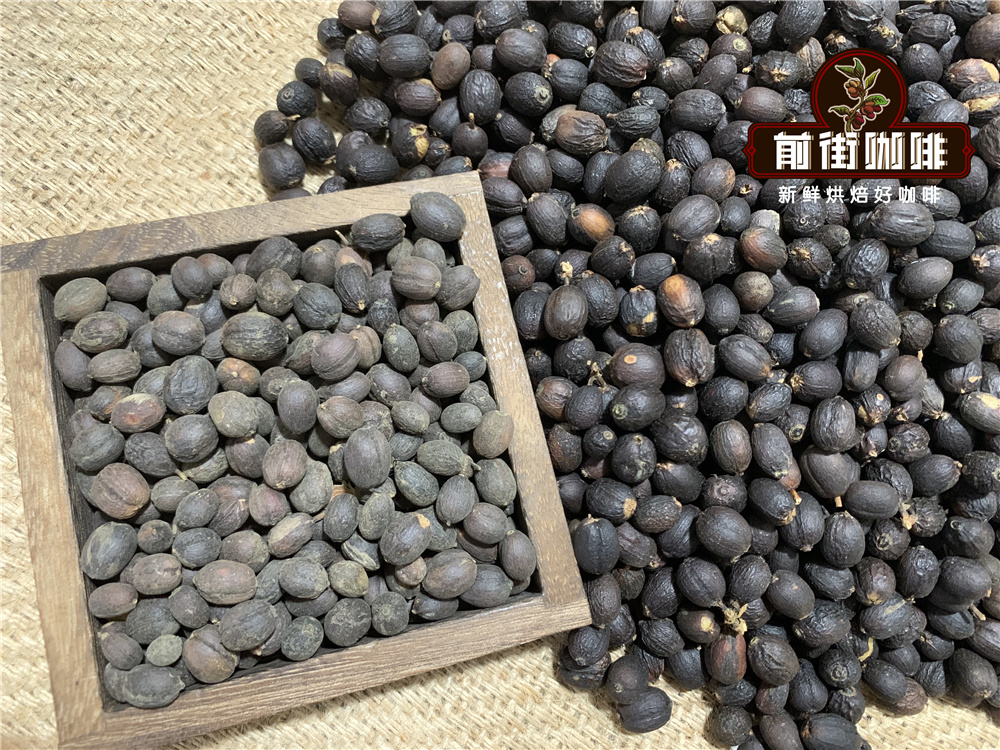A brief introduction to the treatment method of grinding degree and baking degree of Yunnan Tieka coffee beans

Yunnan coffee is a variant of Arabian original species, which is generally known as Yunnan small-grain coffee, evergreen shrub, with small nuts, thick peel, sweet pulp, mellow products and low caffeine content, so it is also called light coffee. The quality of the world's main cultivated varieties of coffee depends on the growing environment, climate, cultivation and management techniques and other factors. Its excellent growth environment is low latitude, high altitude, sufficient rainfall and suitable sunshine, so the north latitude is 15. The ideal growing area for coffee is between the Tropic of Cancer and the Tropic of Cancer. Our planting base in Yunnan is located in 23 ℃ north latitude and 99 ℃ east longitude, with an elevation of 1230 meters, a height of 1540 meters, a height difference of 310 meters, a topography of mountains and slopes, and a large undulation, fertile soil, sufficient sunshine, rich rainfall and large temperature difference between day and night, these unique natural conditions have formed the special taste of Yunnan coffee-thick but not bitter, fragrant but not strong, slightly fruity, and the quality is similar to Colombian small grain coffee. Coffee fresh fruit is generally picked from November to February of the following year and processed by washing and wetting. Advanced imported equipment is used in coffee processing. At present, 30% of Yunnan coffee products are supplied to the domestic market and 70% are sold abroad.
Typica: the oldest native variety in Ethiopia and southeastern Sudan. All Arabikas are derived from Tibika. The flavor is elegant, but the physique is weak, the disease resistance is poor, the fruit yield is less. Excellent manor beans such as the Blue Mountains of Jamaica, Manning of Sumatra and Kona of Hawaii all belong to Tibika. The top leaf of Tibika is red and bronze, which is called red top coffee. Tibika belongs to Arabica.
1) an appropriate amount of pure water; pure water or filtered tap water used in household drinking fountains can be used.
2) some coffee beans / coffee powder
The amount of water in a cup of coffee in a siphon pot is 110ml (but it will be reduced by about 1/5 after brewing), and the corresponding coffee powder is about 15g.
If the conditions are right, it is best to choose coffee beans within 10 days from the factory and grind them into coffee powder before brewing coffee.
The fineness of coffee powder can refer to the thickness of "ultra-fine granulated" sugar sold in the market.
3) A set of siphon coffee maker (Hario TCA- 3 is used here), including: upper cover, upper seat, lower seat, siphon pot bracket, filter, alcohol lamp (using 95% industrial alcohol) and alcohol lamp windshield. Because the firepower of the alcohol lamp is difficult to adjust during use, it is necessary to turn it down (the cotton core only needs to leak slightly from the top 2mm to 3mm).
4) one spoon for 10 grams of coffee
5) stir the bamboo stick.
6) A piece of filter cloth or filter paper used in the siphon pot; the filter cloth should be ironed with hot water before being used for the first time to remove the odor.
7) A damp rag
8) A pointer clock for timing
Specific cooking steps:
1) add an appropriate amount of pure water to the lower seat of the siphon kettle (heated pure water can be used to shorten the time of boiling water. In this operation, the amount of water added is 2.5 cups, that is, about 280 milliliters, two cups of water is for guests / friends, and the extra half cup is for the brewers to taste in advance. If the taste is abnormal at that time, do not give it to the guests, hehe)
2) when there is enough fuel in the alcohol lamp, ignite it and place it directly under the lower seat of the siphon kettle.
3) fix the filter with filter cloth / filter paper on the upper seat of the siphon kettle and make sure that the position of the filter is in the center (if the position is off, it can be adjusted with a bamboo stirring rod)
4) pour the right amount of coffee powder (2.5 cups of water corresponds to about 37 grams of coffee powder, which can be adjusted according to your taste) into the upper seat of the siphon pot. Shake the upper seat horizontally so that the coffee powder is evenly covered with the filter
5) insert the upper seat of the siphon pot obliquely into the lower seat, but not tightly (if the upper seat is inserted after the water is boiled, boiling hot water may suddenly erupt, which is quite dangerous, remember!)
6) when the water in the lower seat is boiling completely, move the alcohol lamp away for about 10 seconds, then move it back, but do not put it directly under the lower seat, it should be slightly off the center. This has two purposes: one is to reduce the water temperature to about 95 degrees, and the other is to reduce the firepower of alcohol lamps (as mentioned earlier, alcohol lamps are not very convenient in adjusting firepower. This is also the reason why some people rotate to use two alcohol lamps or gas stoves with adjustable firepower)
All the coffee beans grown in Yunnan are Arabica coffee beans. The varieties were first introduced in 1892 in Zhukula area, Pingchuan Town, Binchuan County, Dali Prefecture, Yunnan Province. Arabica bourbon and Arabica Tippica coffee beans were introduced. Kenya Katimo (Arabica and Robusta) was introduced in 1991, which belongs to Arabica small variety beans. As the earliest bourbon and tin khaki beans are small, commonly known as small-grain coffee beans, coupled with the production of Yunnan, so later generations will produce coffee beans in Yunnan, collectively known as Yunnan small-grain coffee. At present, there are three coffee varieties in Yunnan: bourbon, Tippika and Katimo (variety). The main producing areas are Lincang, Baoshan, Simao, Xishuangbanna and Dehong Prefecture.
The characteristics of Yunnan coffee: due to the unique geographical environment and climatic conditions, Yunnan coffee has formed a unique flavor of strong but not bitter, fragrant but not strong, with a little fruit flavor. World-class coffee experts evaluate it as a good coffee in the world, and its cultivation techniques. Per unit yield is also world-class.
Important Notice :
前街咖啡 FrontStreet Coffee has moved to new addredd:
FrontStreet Coffee Address: 315,Donghua East Road,GuangZhou
Tel:020 38364473
- Prev

Yunnan Coffee Bean Variety Yunnan Coffee producing area History Story description of flavor and taste characteristics of 2013 small grains of coffee in Qianjie
For the future, local governments in Yunnan have also drawn a blueprint: Dehong is planning to expand the coffee planting area from the current 100000 mu to 200000 mu in the next few years; Lincang plans to expand the existing 20, 000 mu coffee forest by 10 times to 200000 mu in the 12th five-year Plan; Pu'er also plans to expand the 220000 mu coffee forest to
- Next

Yunnan fine coffee bean varieties planting geographical location climate altitude profile
Yunnan coffee is said to have been handed down by the French 70 or 80 years ago. The main production variety is Arabica Arabica, that is, the so-called Arabica coffee, commonly known as Yunnan Arabica coffee. Yunnan's high-quality geographical and climatic conditions provide good conditions for coffee growth. The planting areas are Lincang, Baoshan, Simao, Xishuangbanna, Dehong and other prefectures. Yunnan's natural conditions are very similar to those of Colombia
Related
- Detailed explanation of Jadeite planting Land in Panamanian Jadeite Manor introduction to the grading system of Jadeite competitive bidding, Red bid, Green bid and Rose Summer
- Story of Coffee planting in Brenka region of Costa Rica Stonehenge Manor anaerobic heavy honey treatment of flavor mouth
- What's on the barrel of Blue Mountain Coffee beans?
- Can American coffee also pull flowers? How to use hot American style to pull out a good-looking pattern?
- Can you make a cold extract with coffee beans? What is the right proportion for cold-extracted coffee formula?
- Indonesian PWN Gold Mandrine Coffee Origin Features Flavor How to Chong? Mandolin coffee is American.
- A brief introduction to the flavor characteristics of Brazilian yellow bourbon coffee beans
- What is the effect of different water quality on the flavor of cold-extracted coffee? What kind of water is best for brewing coffee?
- Why do you think of Rose Summer whenever you mention Panamanian coffee?
- Introduction to the characteristics of authentic blue mountain coffee bean producing areas? What is the CIB Coffee Authority in Jamaica?

